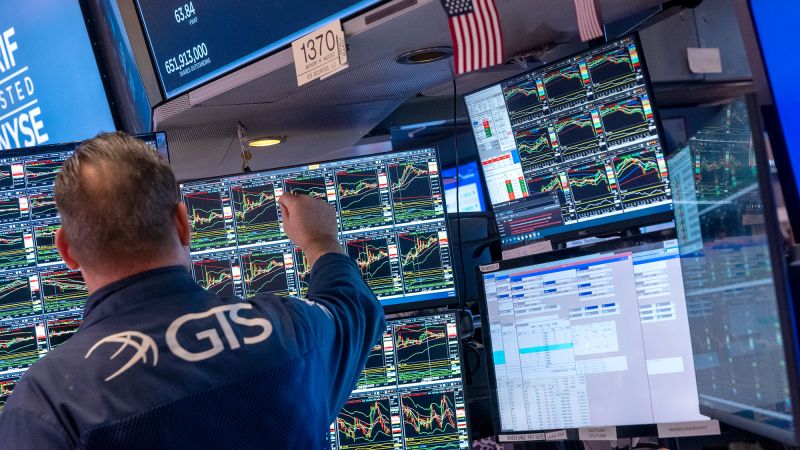Wall Street experienced a dramatic shift this week, transforming what seemed to be a promising rally into a significant downturn. After a hopeful morning fueled by affordable stock prices and expectations of trade negotiations, the markets plummeted following the announcement of hefty tariffs on China. This sudden change highlights the volatility that often characterizes stock trading in response to geopolitical events.
Market Decline After Tariff Announcement
On Tuesday afternoon, U.S. stocks dipped sharply, with the Dow Jones Industrial Average losing 240 points, or 0.6%. The S&P 500 fell by 1.3%, while the tech-heavy Nasdaq Composite dropped 1.8%. The decline was triggered by the White House’s announcement that President Donald Trump plans to implement an additional 84% tariff on all imports from China, totaling a staggering 104% on these goods.
- Morning Gains: The S&P 500 and Nasdaq had initially surged by 4% and 4.5%, respectively, before the announcement shifted investor sentiment.
- Expert Insight: Thomas Martin, a senior portfolio manager at Globalt Investments, remarked, “We’re not anywhere out of the woods yet, which dampens optimism.”
Investor Sentiment and Market Reactions
In recent days, Wall Street investors had been anxious for any positive indication regarding tariffs, as escalating tensions have raised fears of a recession. Over the past three trading sessions, stock prices took a hit, prompting investors to seek buying opportunities amid concerns about Trump’s trade policies.
- Price-to-Earnings Ratio: The S&P 500’s price-to-earnings ratio fell below 17, historically considered a bargain, encouraging investors to view certain stocks as undervalued.
- Market Behavior: Truist’s Keith Lerner commented, “This is a typical market reaction after a shock,” emphasizing the erratic nature of market movements during uncertain times.
The Search for Trade Negotiations
As traders remain on edge for news from the White House, there’s a palpable sense of anticipation. National Economic Council Director Kevin Hassett indicated that the administration is inundated with requests for negotiations from various countries, indicating a focus on strengthening ties with Japan and South Korea.
- Recent Communications: Trump tweeted about a productive conversation with South Korea’s Acting President and mentioned Japan’s Prime Minister, who will send a delegation to Washington for trade discussions.
- Market Volatility: The VIX index, which gauges market volatility, rose on Tuesday, reflecting traders’ anxiety. The sentiment was described as “extreme fear,” although it showed slight improvement from earlier in the week.
Global Implications and Future Outlook
The escalating trade war between the U.S. and China is increasingly viewed as a high-stakes standoff. Both economies face the potential fallout of prolonged conflict, with experts warning of the risk of recession if tariffs continue to rise.
- China’s Response: The Chinese government vowed to “fight to the end” against U.S. tariffs, signaling their commitment to resist pressure from Washington.
- Economic Forecasts: Major banks like Goldman Sachs and JPMorgan Chase have predicted that further trade tensions could lead to a global recession in 2023, dampening demand for stocks.
Contrasting Perspectives on Trade Policies
While some Trump administration officials express optimism about future market recovery, others, including JPMorgan Chase CEO Jamie Dimon, caution against the adverse effects of tariffs. Even allies of the administration have voiced concerns about the potential economic impact of these policies.
- Peter Navarro, Trump’s trade advisor, expressed confidence in a market rebound, stating, “It’s finding the bottom now,” while contrasting voices highlight the risks associated with current trade strategies.
As investors navigate this turbulent landscape, the focus remains on potential developments in trade negotiations and their implications for the U.S. economy. The outcome of these negotiations will be crucial in determining whether optimism can return to Wall Street or if further declines are on the horizon.










